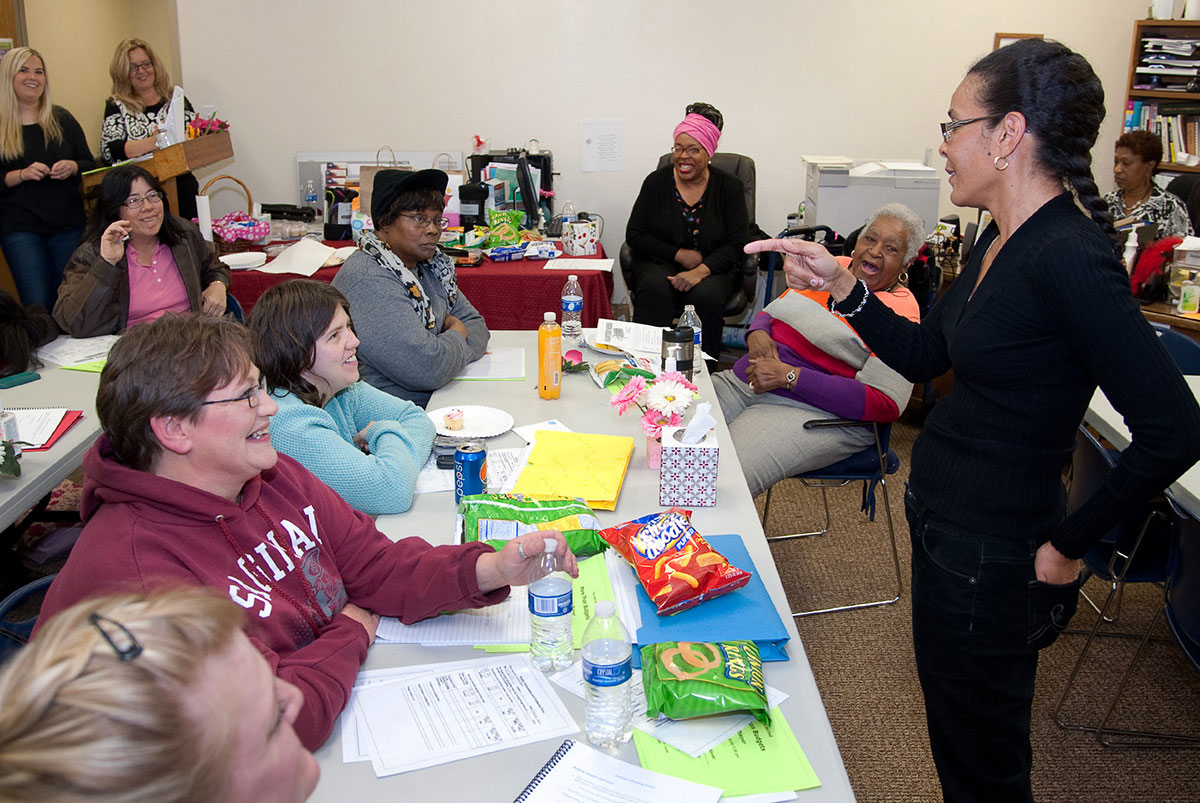More than budgets
Economic development scholar Dawn Elliott helps people in transition with financial literacy.

Dawn Elliott, an associate professor of economics, started the More Than Budgets program in 2009 to show people in transitional situations how to save money.
More than budgets
Economic development scholar Dawn Elliott helps people in transition with financial literacy.
When Vanessa Adams participated in a financial literacy program at a community-based organization, she was desperate about the impending end of her unemployment benefits.
Volunteer leaders with More Than Budgets gave Adams a useful vision of financial stability. “Even in that particular season, I was able to save,” she said about the free program at the Community Enrichment Center in north Fort Worth. Dawn Elliott, an associate professor of economics, started the program to show people in transitional situations how to save money. “Who doesn’t know it is a good idea to save?” she said. “Yet so many people don’t save, from all kinds of income groups. ”
But people in transitional situations have extra difficulties, so Elliott developed a program to address their needs. The program launched six years ago at the Union Gospel Mission, the transitional housing center near downtown Fort Worth, eventually expanding to other organizations around the area.
Leslie Thompson, director of education and employment ministries at the Community Enrichment Center, appreciated the targeted nature of the assistance. “The great part of the program is that it meets people right where they are,” she said.
“Our interest is trying to help people who are ready to save.”
Dawn Elliott, associate professor of economics and founder of More Than Budgets program
Elliott recruited volunteers from the financial services industry to lead participants through exercises to evaluate spending priorities. The professional specialists teach credit management and consumer protection policies, and TCU student volunteers assist with financial literary lessons in an accompanying workbook.
Al Godoy, a long-time volunteer with the program, leads the budgeting sessions to help participants shift their perspectives about money. “Budgeting and managing how they spend their money will start changing their life situation,” he said.
Elliott said scholars in development theory long posited that overall macroeconomic growth would improve the fate of everyone, but individuals were often left out of the equation.
In 2007, the professor sent students in her economic development course to community-based organizations serving the poor in Fort Worth to “get a sense of what poverty looks like,” she said. Afterward those students reported on the many faces of the poverty they encountered and the paralyzing money mismanagement skills.
Most people in transitional situations have little or no access to traditional banking services. Many also lack family support systems. Others like Adams just fell on rough luck, losing jobs while trying to support a family.
To address the financial illiteracy piece of the problem among this demographic segment, Elliott searched for programs usable in transitional centers. “As for books we could use, there were none for that group,” she said. Thus, she created the More Than Budgets program.
Without any “grand vision” of eradicating poverty, Elliott hoped for incremental change and wanted to assist people in saving emergency funds so the next catastrophe wouldn’t hit with the same detrimental force.
Funded by small grants from TCU and Comerica Bank, Elliott originally launched a nine-week program but eventually reduced it to the current six weeks.
“O ur interest is trying to help people who are ready to save,” the professor said. Poverty is a “complicated beast,” she said, and lack of financial resources is a plague.
ur interest is trying to help people who are ready to save,” the professor said. Poverty is a “complicated beast,” she said, and lack of financial resources is a plague.
Elliott and Gerald Oriol, Jr., Secretary of State for the Integration of Persons with Disabilities in Haiti, discussed the financial literacy program when he visited Fort Worth in 2013 as TCU’s first Global Innovator.
After a year of discussion, the professor, James English from TCU’s Office of International Student Services, and Oriol decided to combine efforts. More Than Budgets then partnered with Fonkoze, the largest micro-financial institution in Haiti.
With grant funds from TCU and the Digicel Foundation, Elliott modified More Than Budgets to help Fonkoze assist rural Haitians with disabilities. Most of the Haitian participants are illiterate, so Elliott, English and Fonkoze developed a visual replica of the program.
At TCU, Elliott’s students talk with Fonkoze staffers over Skype. She wants her students to think about the real-world efficacy of what they are doing in class and to “consider really critically what NGO-type interventions … can or can’t do.”
For successful saver Adams, who is now happily employed, the point of the program was more than budgeting skills. “[It] gave me such hope that everything was going to be okay.”

Your comments are welcome
1 Comment
Yay! This is great, and I am proud to have been a participant.
Related Reading:
Campus News: Alma Matters
From Applicant to Accepted
Learn about the admission counselor’s role in guiding future Horned Frogs.
Campus News: Alma Matters
TCU’s Library Celebrates a Century
Uncover hidden gems of the academic hub, from vintage mechanics to modern masterpieces.